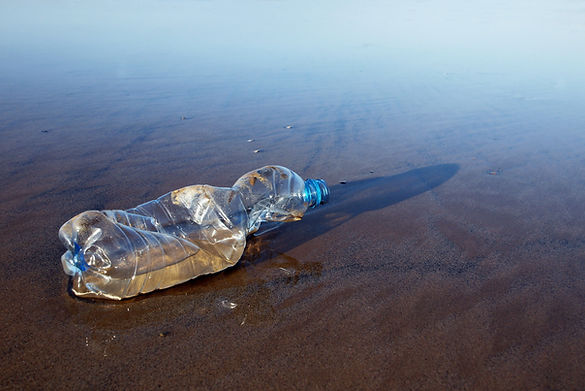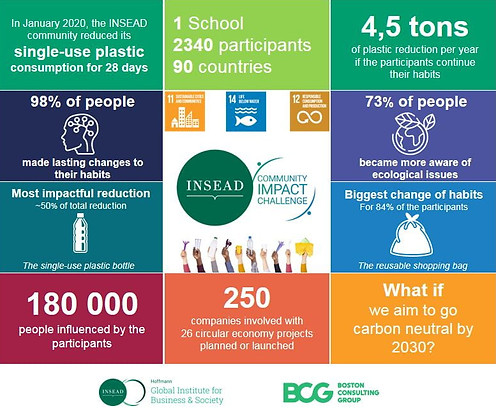

Single Use Plastic Challenge
(2019/20)
The Single Use Plastic Challenge was the first challenge launched by CIC. It aimed to bring together members of the INSEAD community for a positive global impact by tackling three of the UN’s Sustainable Development Goals – SDG12: Responsible Consumption and Production, SDG11: Sustainable Cities and Communities and SDG14: Life Below Water – issues that are becoming increasingly more pressing given the current global instability the world is facing.
Why Single Use Plastics?
While economically cheap and convenient, the cost that plastics impose on the planet is immense. Half of the 300 million tons of plastic we produce every year is for a single-use purpose. Mostly dumped into the ocean, causing serious suffering and irreparable damage to the quality and the diversity of marine life, while costing us the balance and harmony of our ecosystem.

The Challenge
The Challenge garnered significant enthusiasm and engagement, with 2,340 INSEAD participants from more than 90 countries taking part.
Together, they reduced their annual consumption of plastics and that of their network by 4,500kg per year, or 3.7kg per person.
Weight reduction was largely in three categories: (1) plastic bags, (2) plastic bottles and (3) wrappers.
Participating in the Challenge also created a noticeable shift in mindset and behaviours, with 73% more aware of ecological issues and 98% making lasting changes to their habits.
93% of the participants indicated their interest in participating in the next challenge.

Through the network, the INSEAD community reached an additional 180,000 people on average. Extending the Challenge to just a fifth of all INSEAD alumni would reach an estimated 787,000 people.
Katell Le Goulven, Executive Director of the Hoffman Institute, said,
“This first challenge demonstrated the powerful force for good that the INSEAD community can be when we unite and act purposefully towards our stated goals. Preventing plastics from entering our oceans is essential to protecting the natural resources that support healthy economies and societies. I look forward to collaborating with the community on our next significant challenge and engaging more individuals for greater impact.”
CIC co-founder Paolo Senes was encouraged by the results adding,
“This began as a conversation between two people and grew through a core team of volunteers. It expanded through the tireless efforts of each new recruit engaging a few others from their class or country, one at a time. Dozens turned into hundreds, and hundreds turned into thousands. This is the power of our INSEAD community. We accomplished it once. We can do it again.”
See the full report here, courtesy of Boston Consulting Group.
How did the participants find the experience?
While we cared about achieving CO2 reduction, we also asked our participants how they experienced the challenge. It was encouraging to learn that most participants found it inspiring, necessary, and motivating.

The biggest source of savings...
According to participant feedback and BCG's analysis, packets, wrappers, plastic bags, and plastic bottles may be the largest contributors to plastic reduction.

More encouraging results...
One of the most encouraging pieces of feedback we received was the participants' intention to continue their new habits.
The challenge prompted a shift in both mindset and behaviour:
-
80% indicated an increased awareness of environmental issues after the challenge.
-
98% indicated they would adhere to their new habits.
Respondents changed their habits primarily by using reusable bags (84%), utilizing drinking containers (82%), and avoiding processed foods (52%).
While participants acknowledged the challenge of reducing plastic usage, they also highlighted some remarkable recommendations, such as:
-
Government subsidies for potential solutions;
-
Education about the prevalence of plastics, their impact on nature, and methods to reduce usage;
-
Government regulations, such as banning plastic bottles;
-
A centralised platform to show where to buy products without plastic;
-
A mobile app for tracking consumption and gamification;
-
DIY solutions;
-
Small efforts in small groups, such as interest groups or local communities.

